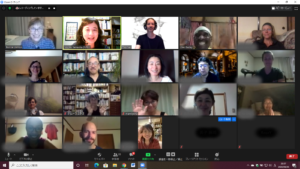Author Archives: nfsjadmin
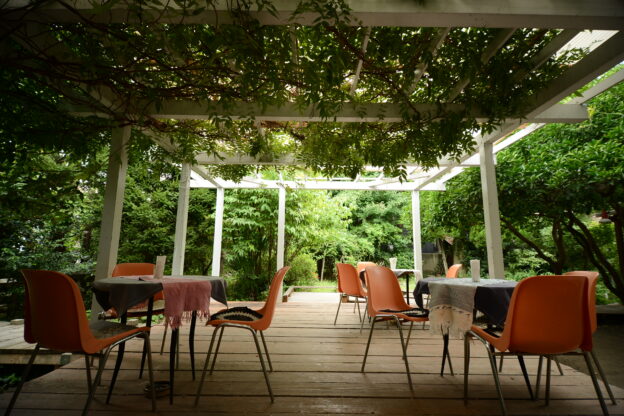
Nov.8 (English Event) NFSJ Café #31 ”Supporting Minorities in Japan – Reflecting on the 25 Years of the Bazaar Café”
Located in the heart of Kyoto, 《Bazaar Cafe》 is a wonderful place that boasts stylish ethnic lunches. At first glance, it looks like an ordinary café, but in fact, it has been operated to support people with various difficulties, such as shut-ins, addicts, sexual minorities, and migrant women. We welcome Ms. Martha Mensendiek, who has been involved with this cafe since its establishment and has been supporting mainly migrant women for many years at Kyoto YWCA and other organizations.
Since the 1980s, female survivors who have continued to live in Japan despite being victims of human trafficking and domestic violence are now facing new challenges due to the aging of the population. Martha, also a member of the Solidarity Network with Migrants Japan (SMJ) with whom NFSJ has been working with in the Japan Network Against Trafficking in Persons (JNATIP), will share her most important message to Japanese society. Please join us.
《Date & Time》November 8, 2023 (Wed.) 19:30~21:00
《Place》Online (Zoom)
《Language》 Mainly English (Japanese can also be used in Q&A.)
《Admission》 Free *Please make a reservation
《Reservation》Use the link below to fill in the reservation form. We will send the Zoom link to your email address 2 hours prior to the event.
https://forms.gle/tcwc4v47iYZifWmx5
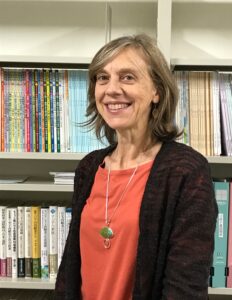 《Guest Speaker》 Ms. Martha Mensendiek
《Guest Speaker》 Ms. Martha Mensendiek
Associate Professor, Doshisha University,
Department of Social Welfare
Representative of “Bazaar Café”
Born in New York, raised in Sendai Japan. Graduated from Earlham College, and Master of Social Work from University of Hawaii, School of Social Work. Past work experience include caseworker at HELP Shelter in Tokyo, Kyoto YWCA, and Interagency for Immigrant Services, in Honolulu Hawaii.
Research interests include International Social Work, social work practice with immigrant communities, culturally anchored social work practice, domestic violence, substance abuse, human trafficking and community organizing.
English flyer: 20231108 NFSJ Cafe #31 Flyer (E)
Sponsored by Not For Sale Japan, which works on issues of human trafficking and modern slavery, NFSJ Café is a casual learning experience where interested participants and NFSJ staff talk about a theme or watch a film over a cup of tea. Please feel free to join us.
Contact: japan@notforsalecampaign.org
NFSJ Reading Session 2023
We are going to read Japanese translation of Monique Villa’s “Slaves Among Us: The Hidden World of Human Trafficking” in the five online reading sessions on July 25th through August 29th. This event will be conducted in Japanese.
NFSJ Cafe #30 Protecting Children from Online Sextortion
This event will be conducted in Japanese.
Please contact japan@notforsalecampaign.org if you need assistance.
3/17 SSRC Seminar on Ethical Report Card of Companies
(This is an announcement of the event to be conducted in Japanese.Iapologize for inconvenience.)
2/4・2/23 JNATIP Online Seminars
(This is an announcement of the event to be conducted in Japanese. Please see the Japanese page. Thank you!)
12/26 (English Event) NFSJ Café #29 “Let’s Learn about New/Revised Laws on Protection of Women in Japan”
NFSJ Café #29
“Let’s Learn about New/Revised Laws on Protection of Women in Japan”
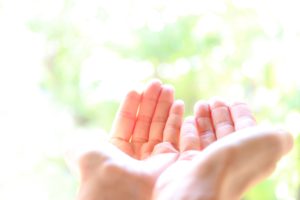 This year we have seen the passage of several laws and amendments to laws related to support and protection of women in Japan. Some of these laws were passed in response to longstanding requests by women’s support groups, while others were enacted as a result of swift action by support groups and lawmakers who shared a sense of crisis triggered by a certain event.
This year we have seen the passage of several laws and amendments to laws related to support and protection of women in Japan. Some of these laws were passed in response to longstanding requests by women’s support groups, while others were enacted as a result of swift action by support groups and lawmakers who shared a sense of crisis triggered by a certain event.
NFSJ staff members have conducted research on these movements, which even Japanese speakers have difficulty in understanding, and will share them with English speakers interested in this issue.
This event will be held with the hope that everyone will learn about this important legal change concerning women that has finally begun to take place in Japan, and that they will be able to support the people and organizations that are involved in this important change. Please join us even though it is a busy time at the end of the year.
《Date&Time》Mon. Dec. 26, 2022, 19:00-20:30
《Venue》Online (Zoom)
《Admission》 Free *Reservation required
《Language》English
《Reservation》Use the link below to fill in the reservation form.
We will send the Zoom link to your email address 2 hours prior to the event.
https://forms.gle/XtrsMPqki3bC8WdA8
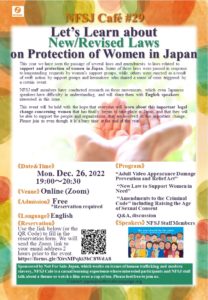 《Program》
《Program》
“Adult Video Appearance Damage Prevention and Relief Act”
“New Law to Support Women in Need”
“Amendments to the Criminal Code” including Raising the Age of Sexual Consent
Q&A, discussion
《Speakers》NFSJ Staff members
Sponsored by Not For Sale Japan, which works on issues of human trafficking and modern slavery, NFSJ Café is a casual learning experience where interested participants and NFSJ staff talk about a theme or watch a film over a cup of tea. Please feel free to join us.
Contact: japan@notforsalecampaign.org
Flyer download: 20221226 NFSJ Cafe #29 Flyer (E)
NFSJ World Day Against Trafficking in Persons Campaign 2022: Looking Back at NFSJ Cafes (July 30 – August 30, 2022)
To commemorate World Day Against Trafficking in Persons on July 30, NFSJ conducts an annual online awareness campaign.
This year, out of the 28 NFSJ Cafés that have been held so far, we selected the most memorable sessions and seven staff members created short report articles. In the past month, we have posted 10 articles on our website and shared them on social media.
Looking Back at NFSJ Cafés
http://notforsalejapan.org/en/looking-back-at-nfsj-cafes
NFSJ Cafes have covered all aspects of human trafficking and modern slavery, or the various issues that exist around it. The topics covered in these reports range from Kabukicho night patrols and Dogenzaka night walks, to LGBT and immigration issues, to sex industry and sexual consent, and connections to industries such as mining and seafood.
If any of the topics caught your interest, please read on.
*The Reason Why We Hold NFSJ Cafes http://notforsalejapan.org/en/nfsj-cafes/202207/974
*The list of past NFSJ Cafe:
http://notforsalejapan.org/wp-content/uploads/2022/07/NFSJ-Cafe-List.pdf
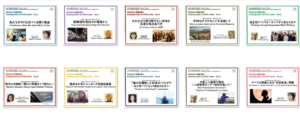
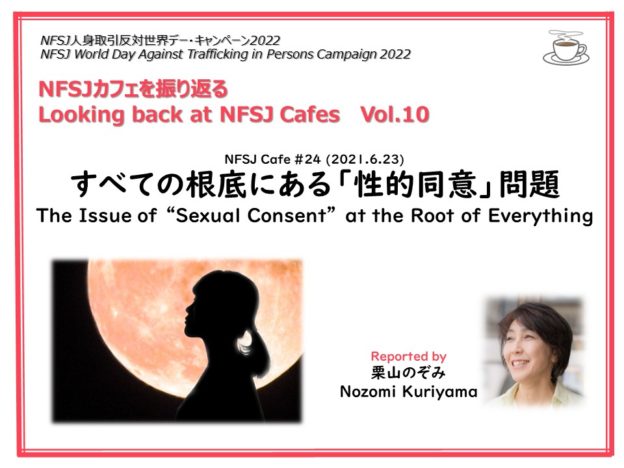
Vol.10 “The Issue of “Sexual Consent” at the Root of Everything: Thoughts from the Front Lines of Supporting Victims of Sexual Exploitation”
(NFSJ Café #24, June 23, 2021, Held online)
Guest lecturers: Ms. Megumi Oka (a counselor at the NPO PAPS)
NPO PAPS is a member of JNATIP (Japan Network Against Trafficking in Persons), of which NFSJ is a member, and Ms. Oka is a member of its steering committee. A few years ago, I had the opportunity to assist Ms. Oka in her preparations for a meeting with the Japanese Government and JNATIP. At the time, Ms. Oka murmured, “Anyway, sexual consent is the root of sexual exploitation,” which led to the realization of this NFSJ Café.
From the very beginning of the lecture, key words like “self-determination of the body,” “boundary” and “sexual consent” came up. Both children and adults have the right to “body self-determination,” or how to treat their own bodies. She explained that we can also decide the distance and boundaries between ourselves and others as we see fit.
There are also “private zones,” which we do not show to others or allow them to touch, and if someone tries to, it is OK to say “No!” in a clear voice. Many of the victims who consult with PAPS are unaware of these rules.
During the discussion time, participants said, “We were not taught these things either” and “This is a basic problem that needs to be addressed before sex education. It is important to teach children how to take care of their own bodies from an early age.”
The key points I understood regarding sexual consent are:
– Sexual consent is possible only in a relationship of equals. It is difficult to be established under unbalanced power relationships, such as parent-child, teacher-student, etc. In situations like adult video performances, where there is a contractual relationship or where money is paid, there is no sexual consent because the relationship is unequal.
– Sexual consent should be confirmed every time. Even if you consented in the past, you can say no if you don’t want to now, and your will should be respected. In photography and videography, it is necessary to confirm the consent of the photographer and the subject, not only at the time of shooting but also at the time of viewing. However, since this is almost impossible in reality, sexual consent is not possible with images, videos, etc.
It made sense to me.
In other words, in commercial as well as private filming, sexual images and videos do not constitute sexual consent in the first place. In order to create a society where people are not sexually exploited, this concept of sexual consent must be widely known. It is necessary to have the common sense that whoever says “no” must always be respected.
Another thing that impressed me was the importance of what kind of message society sends to the younger generation on a daily basis. The social tendency to emphasize self-responsibility makes victims think that it is their own fault, and makes it difficult for them to ask for help.
You are definitely not to be blamed. Whenever you realized, “I really didn’t like it! ” you can ask for help. It doesn’t matter if you were paid for it. Talk to us first!
This is the message we at NFSJ want to send out.
(Nozomi Kuriyama)
*NPO “PAPS” website
https://www.paps.jp/?lang=en
*Enforcement of the AV Appearance Victimization Prevention and Relief Act (June, 2022)
https://mainichi.jp/english/articles/20220616/p2a/00m/0na/034000c
https://www.japantimes.co.jp/news/2022/06/15/national/crime-legal/japan-porn-recruit-protection/
*For more information on Ms. Oka’s profile, refer to the NFSJ Cafe #24 announcement page.
http://notforsalejapan.org/en/news/202105/853
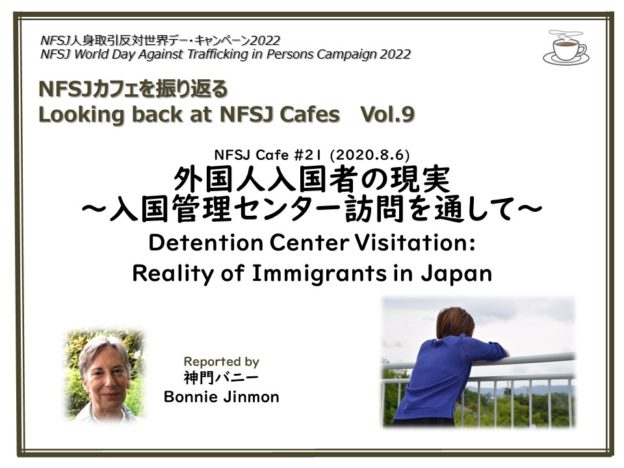
Vol.9 “Detention Center Visitation: Reality of Immigrants in Japan”
(NFSJ Café #21, August 6, 2020 Held online)
Guest lecturers: Mr. Alex Easley (Leader of the Detention Ministry at Tokyo Baptist Church)
and Mr. Thomas Ash (journalist, film-maker, St. Alban’s Church member)
Before COVID-19, many foreigners came to Japan for various reasons, including to earn money to send back to their families. With the aging workforce in Japan, they have been invaluable and support the Japanese economy. Still others are refugees and asylum-seekers fleeing political or other persecution. Some members of both groups have been unfairly detained in Immigration Detention Centers throughout the country, sometimes enduring inhumane treatment.
Migrant workers and refugees are vulnerable to human rights violations and are closely linked to Human Trafficking.
So I was privileged to facilitate this cafe where we heard from Mr. Alex Easley and Mr. Thomas Ash who have spent years going to centers to visit and support these detainees.
We learned that they are allowed to visit and talk to men for 30 min. at a time, sometimes seeing up to 5 people a day. (I went once to Shinagawa’s Center and visited 2 women). Each detainee has a different story, so they listen, ask what they can bring the next time, and show/share the love of Jesus with them.
Often there were heart-wrenching stories about why they were detained, the bad conditions, the loneliness, etc.. All the cafe participants were impressed with their dedication to support these men who’ve been affected by unfair immigration policies.
Thomas has made a documentary currently being shown throughout Japan called “Ushiku”. “Based on interviews with foreign nationals detained for long periods of time at the immigration center in Ushiku City, Ibaraki Prefecture, this film reveals the violation of human rights by the authorities.” (Quoted from synopsis from Yamagata International Documentary Film Festival 2021)
I highly recommend you watch the trailer and write-up, and then see it! https://www.ushikufilm.com/en/
It will show in Tokyo again from Sept. 9th. https://www.ushikufilm.com/en/theaters/
(Bonnie Jinmon)
The NFSJ Cafe #21 announcement
http://notforsalejapan.org/en/news/202007/675